Custom Healthcare Software Development: Guide and Benefits
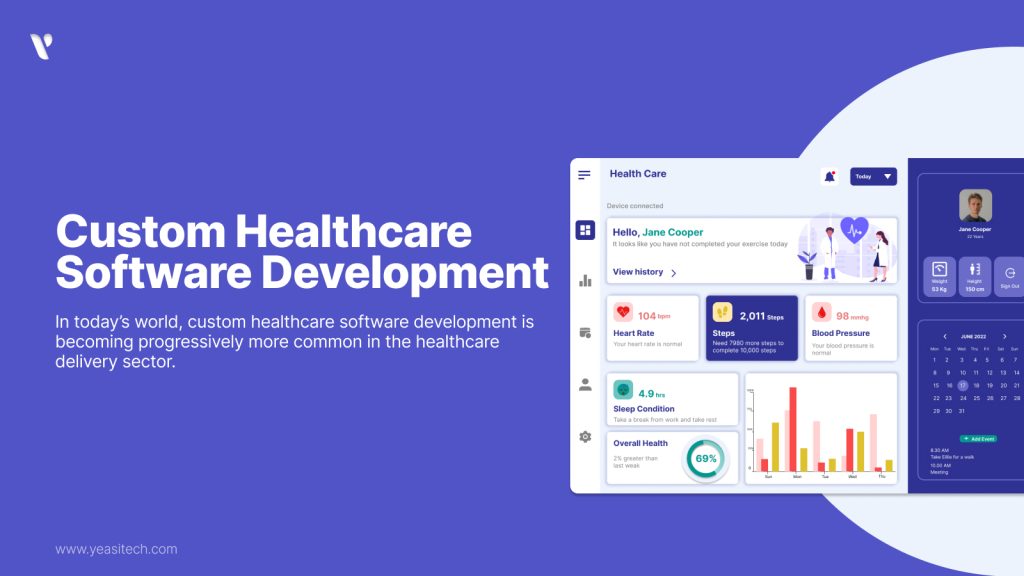
The latest developments at the forefront of digital innovations have been observed in the healthcare sector in recent years. To provide scalable, secure, and profitable results, healthcare firms are now becoming more and more open to introducing new services and solutions.
In today’s world, custom healthcare software development is becoming progressively more common in the healthcare delivery sector. The quality of software engineering in healthcare has led to improved outcomes for patients, faster care delivery, and overall care service simplification as more institutions and businesses invest in and use software development for healthcare services.
Let’s review the various types of software development in the healthcare sector. Now let’s discuss them in detail:
Custom healthcare software development refers to the process of developing customized software to satisfy the demands of patients, healthcare practitioners, and other users. Unlike ready-made software, custom solutions are built from scratch to fit unique requirements, providing more flexibility, scalability, and better integration options.
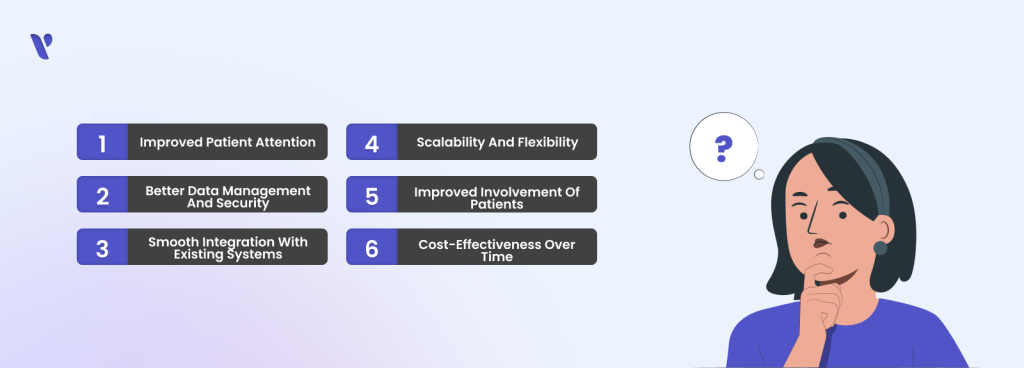
Custom healthcare software development offers numerous benefits that cater specifically to the unique needs and challenges of healthcare organizations. Here are some key advantages:
Custom software brings together schedules, treatment plans, and medical data in one place. This helps doctors diagnose more accurately and create treatments tailored to each patient’s needs.
Hospitals deal with sensitive patient information. Custom software includes strong security features like data encryption and controlled access to keep patient information safe from hackers or unauthorized access.
Custom software can be designed to work smoothly with tools hospitals already use, like Electronic Health Records (EHR). This makes the transition easy and helps keep the hospital running efficiently.
Custom software can grow and adapt as the healthcare facility expands. Whether adding new services, departments, or handling more patients, the software can be updated to meet changing needs.
Features like telemedicine, mobile apps, and online patient portals make it easier for patients to access their medical information, book appointments, and communicate with healthcare providers. This keeps patients more involved in their care.
While custom software may cost more upfront, it saves money in the long run by reducing errors, cutting down the need for multiple apps, and saving staff time. This leads to better efficiency and lower costs overall.
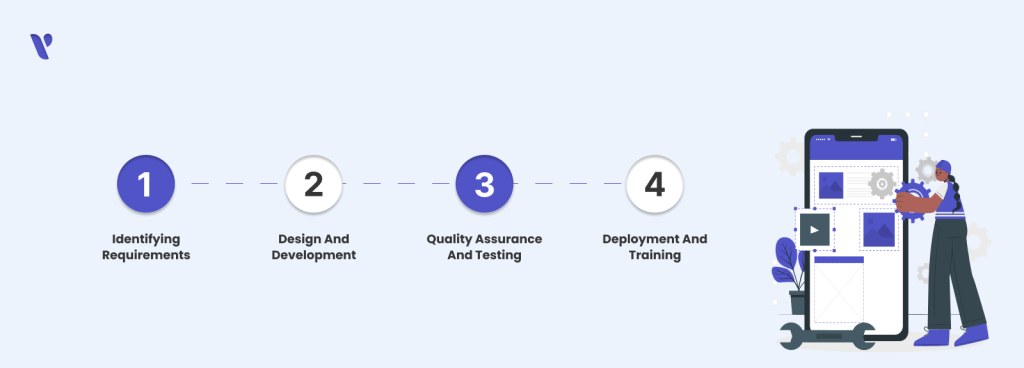
Custom healthcare software development is a complex process that requires careful planning and execution. Here’s an overview of the key steps involved:
Always conduct a study before starting a custom software development project, taking into consideration your organization’s needs, finances, and requirements. Get a second opinion by discussing it with your team, noting the specific requirements, and consulting knowledgeable software designers and doctors.
After analysis, create a software framework outlining features, database, interfaces, and networks. Proceed with development, implementing components and coding using agile methods for better user experience and flexibility.
Thoroughly test the software post-coding to ensure functionality, usability, and security. Fix issues before release to prevent failures.
When the software goes through sufficient testing, it is released into the market or organizational framework. When the software goes through sufficient testing, it is released into the market or organizational framework.
Still confused regarding the steps? Book an absolutely free Consulation with our experts and get valuable advice.
Custom healthcare software development includes a variety of applications and systems aimed at improving healthcare services, improving patient outcomes, and simplifying administrative tasks. Here are some types of healthcare software development:
Let me give you a comparison of both so that you can choose according to your need:
| Feature | Custom Healthcare Software | Off-the-Shelf Solutions |
| Customization | Fully customizable to meet specific organizational needs. | Limited customization; may require adapting processes to fit the software. |
| Cost | Higher upfront cost; tailored development and maintenance. | Lower initial cost; licensing fees may apply. |
| Implementation Time | Longer development and implementation time. | Ready to use; quicker deployment. |
| Scalability | Highly scalable; can grow with organizational needs. | Limited scalability; predefined options may restrict growth. |
| Integration | Seamless integration with existing systems and workflows. | May face compatibility issues with existing systems. |
| Support and Maintenance | Dedicated support; continuous updates based on organizational needs. | General support; updates may not align with specific requirements. |
| Security | Customizable security measures to comply with healthcare regulations. | Security depends on vendor capabilities; may not address all needs. |
| Compliance | Designed to meet specific regulatory requirements like HIPAA. | Compliance features may vary; not always tailored to specific regions. |
| User Experience | Tailored UI/UX for specific user workflows and preferences. | Generic design; may not address all user needs effectively. |
| Long-Term ROI | High ROI over time; reduces reliance on third-party vendors. | Lower ROI; ongoing licensing costs can add up. |
Building healthcare software requires strict adherence to regulatory frameworks.
Ignoring these regulations can lead to fines, legal troubles, and reputational damage. Let our experts guide you through the complexities—schedule a free consultation today!
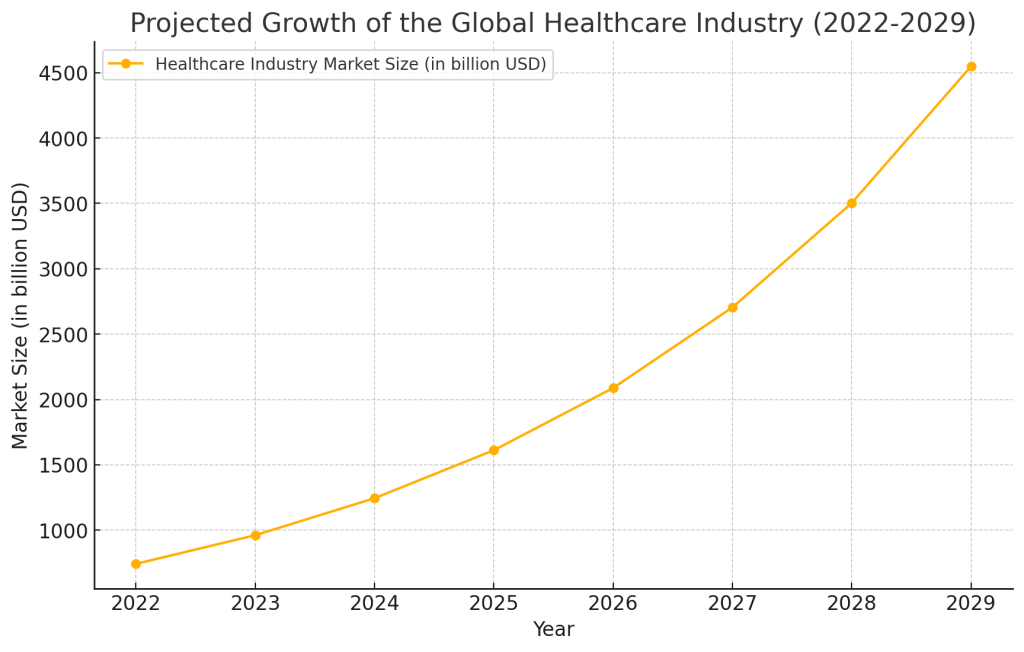
With an estimated annual growth rate of 29.5%, the worldwide digital health industry is projected to rise from $742.72 billion in 2022 to $4,547.70 billion by 2029. Leading businesses in this sector include Philips Healthcare, Apple, Huawei, Cisco, Epic, Oracle Cerner, and Epic.
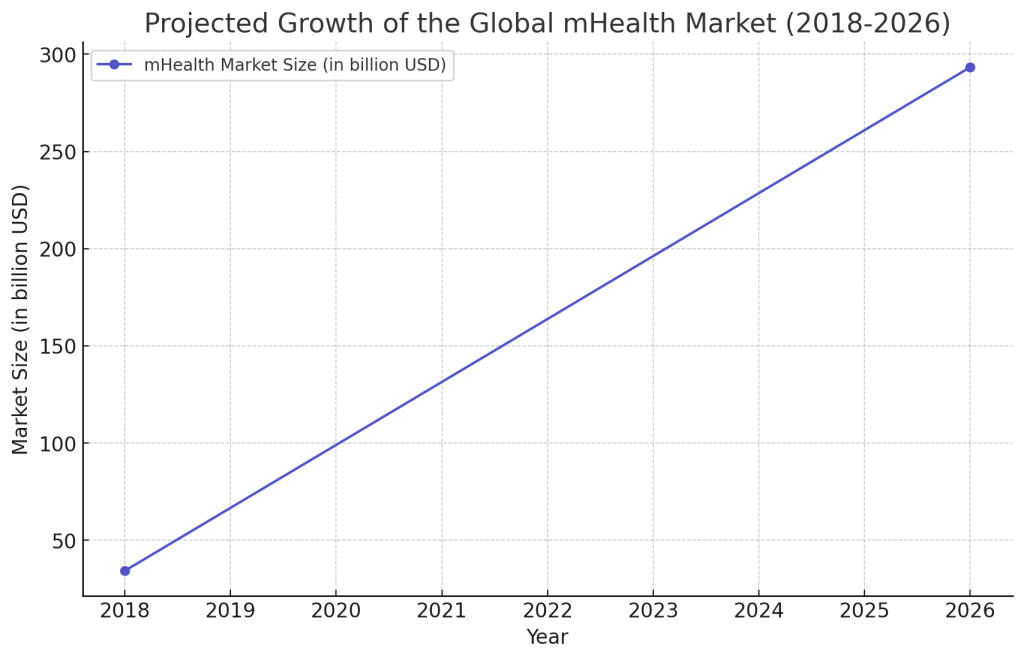
mHealth is the largest market sector based on product type. mHealth is the application of wireless technology and mobile devices, including smartphones and tablets, to improve healthcare. It may be used for a number of things, such as remote patient monitoring, diagnosis, therapy, and supply management for the medical field. The value of the worldwide mHealth market was USD 34.28 billion in 2018. It is anticipated to increase to USD 293.29 billion by 2026.
Here are common challenges in custom healthcare software development and strategies to overcome them:
In 2025, healthcare software development will continue to evolve with exciting new trends. Here’s a simple overview that beginners can easily understand:
AI and ML will become even more important in healthcare software. These technologies can help in things like:
Telemedicine (virtual doctor visits) has grown rapidly, and it’s expected to continue. In 2025, software will improve to:
Blockchain, which is known for secure transactions, will be used to protect patient health data. It will ensure:
More and more people will wear devices (like smartwatches) to track their health. Healthcare software will integrate this data to:
Cloud services will make it easier to store and access healthcare data. Instead of relying on expensive local servers, healthcare providers will use the cloud to:
Here are brief tips for beginners on custom healthcare software development:
By focusing on these basics, you can build a custom healthcare solution that improves care, efficiency, and compliance.
Employees, patients, and administrators all benefit from healthcare software development. With the right software development partner, your journey can be successful, even if it seems complex and challenging. Now that you have a comprehensive understanding of the positive and negative aspects of developing medical software, you’re ready to make a real difference in people’s lives.
If your organization is ready to embrace modern technology and reimagine its approach, get in touch with the experts at YeasiTech. Our team specializes in cutting-edge healthcare software development and can help you discover how the latest advancements can benefit your project or business. Let’s build the future of healthcare together!
Custom healthcare software development involves creating tailored software solutions for healthcare organizations to meet specific needs, such as improving patient care, streamlining workflows, and ensuring data security and compliance with regulations.
Depending on the quantity and variety of features, the tools used to build them, and the platforms they must run on, the development duration for healthcare applications varies greatly. Get in touch with us to find out how long it would take to design the app of your desires.
To guarantee that healthcare professionals can simply browse and use the system, user experience plays an important role in healthcare software.
Medical image analysis, predictive analytics, and personalized treatment are only some of the tasks that AI may perform in healthcare software. Developers are responsible for maintaining data privacy, algorithmic decision-making flexibility, and ethical AI guidelines.
The main benefits include improved patient care, increased operational efficiency, enhanced security, better data management, and the ability to integrate with existing healthcare systems.
Custom software improves patient care by streamlining workflows, reducing errors, and facilitating faster access to patient data, leading to more accurate diagnoses and timely treatments.
The main benefits include improved patient care, increased operational efficiency, enhanced security, better data management, and the ability to integrate with existing healthcare systems.
YeasiTech is a trusted IT service partner with 8+ years of experience, empowering 250+ businesses with scalable web, mobile and AI solutions.
Explore related topics to broaden your understanding and gain actionable insights that can transform your strategies.